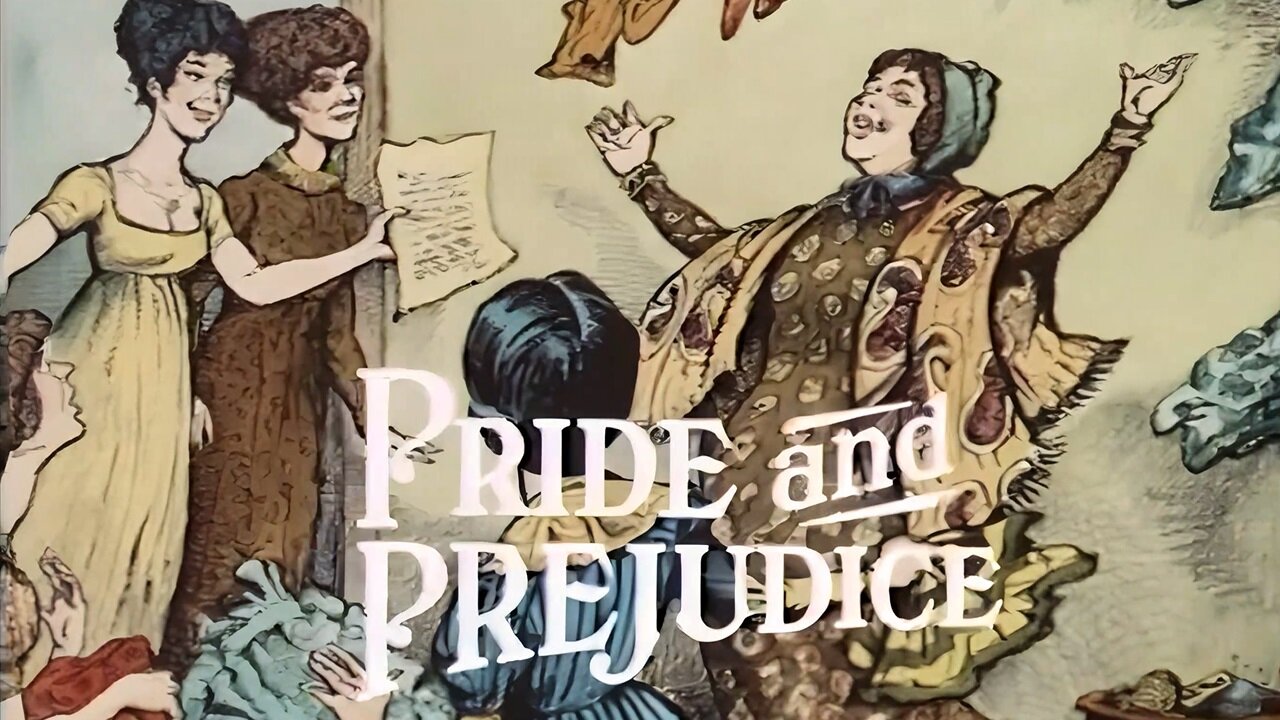Premium Only Content

Pride and Prejudice 1980 Chapter 1
The 1980 adaptation of Pride and Prejudice begins faithfully to Jane Austen’s novel, capturing the essence of early 19th-century English society, where manners, class, and marriage are of utmost importance. Chapter 1 introduces viewers to the social context and central themes of the story, setting the stage for the romantic and social entanglements that follow.
The episode opens in Meryton, a quaint English village where news spreads quickly. A sense of urgency and excitement fills the air as the local residents, particularly the Bennet family, learn that Netherfield Park, a nearby estate, has been let to a wealthy bachelor, Mr. Charles Bingley. This news sparks interest and speculation because, in a society obsessed with status and advantageous marriages, the arrival of a single, wealthy man is seen as an opportunity for eligible young women.
The Bennet family quickly emerges as the focal point. Mrs. Bennet, a talkative and somewhat frivolous woman, is introduced as being deeply concerned with finding husbands for her five daughters. She eagerly discusses Mr. Bingley’s arrival with her husband, Mr. Bennet, hoping that one of their daughters might catch the new neighbor’s attention. Mrs. Bennet’s character, with her humorous exaggerations and obsession with marriage, provides a light, comedic element, setting the tone for the interplay between wit and social commentary throughout the series.
Mr. Bennet, in contrast, is portrayed as an intelligent but sardonic man, often exasperated by his wife’s antics. His dialogue is marked by witty retorts, showing his amusement at his wife’s persistent efforts to marry off their daughters. The dynamic between Mr. and Mrs. Bennet reflects the contrasting attitudes toward marriage—while Mrs. Bennet is entirely preoccupied with social advancement, Mr. Bennet takes a more detached and ironic view of the situation.
The camera then introduces viewers to the Bennet daughters, including Jane and Elizabeth Bennet, who will become central figures in the story. Jane is depicted as gentle and reserved, while Elizabeth, played by Elizabeth Garvie, immediately stands out with her sharp intellect and lively wit. Elizabeth’s perceptive nature and independent spirit are subtly emphasized, laying the groundwork for her character development as she navigates the societal expectations placed upon her.
The visual style of the 1980 BBC adaptation stays true to the period, with detailed costumes, elegant interiors, and a restrained, formal aesthetic. The settings, such as the Bennet household, reflect the genteel poverty of the family—they belong to the landed gentry, but their modest lifestyle places them at a disadvantage in the marriage market. This visual storytelling helps convey the underlying pressures faced by the Bennet sisters, whose prospects are constrained by their family’s limited fortune.
The opening dialogue emphasizes the theme of marriage as a social necessity. Mr. Bennet sarcastically remarks that Mr. Bingley “must be in want of a wife,” directly echoing the famous opening line of Austen’s novel. This establishes the idea that wealth and marriage are inextricably linked, a notion that will be explored throughout the series.
Overall, Chapter 1 of the BBC’s Pride and Prejudice introduces key characters, relationships, and themes with fidelity to Austen’s original text. The performances, particularly Elizabeth Garvie as Elizabeth Bennet and Moray Watson as Mr. Bennet, bring depth and humor to the narrative. The episode skillfully sets the stage for the romantic tension and social challenges that will unfold as the story progresses, capturing both the charm and subtle critique of Regency-era society.The BBC’s 1980 adaptation of Pride and Prejudice begins faithfully to Jane Austen’s novel, capturing the essence of early 19th-century English society, where manners, class, and marriage are of utmost importance. Chapter 1 introduces viewers to the social context and central themes of the story, setting the stage for the romantic and social entanglements that follow.
The episode opens in Meryton, a quaint English village where news spreads quickly. A sense of urgency and excitement fills the air as the local residents, particularly the Bennet family, learn that Netherfield Park, a nearby estate, has been let to a wealthy bachelor, Mr. Charles Bingley. This news sparks interest and speculation because, in a society obsessed with status and advantageous marriages, the arrival of a single, wealthy man is seen as an opportunity for eligible young women.
The Bennet family quickly emerges as the focal point. Mrs. Bennet, a talkative and somewhat frivolous woman, is introduced as being deeply concerned with finding husbands for her five daughters. She eagerly discusses Mr. Bingley’s arrival with her husband, Mr. Bennet, hoping that one of their daughters might catch the new neighbor’s attention. Mrs. Bennet’s character, with her humorous exaggerations and obsession with marriage, provides a light, comedic element, setting the tone for the interplay between wit and social commentary throughout the series.
Mr. Bennet, in contrast, is portrayed as an intelligent but sardonic man, often exasperated by his wife’s antics. His dialogue is marked by witty retorts, showing his amusement at his wife’s persistent efforts to marry off their daughters. The dynamic between Mr. and Mrs. Bennet reflects the contrasting attitudes toward marriage—while Mrs. Bennet is entirely preoccupied with social advancement, Mr. Bennet takes a more detached and ironic view of the situation.
The camera then introduces viewers to the Bennet daughters, including Jane and Elizabeth Bennet, who will become central figures in the story. Jane is depicted as gentle and reserved, while Elizabeth, played by Elizabeth Garvie, immediately stands out with her sharp intellect and lively wit. Elizabeth’s perceptive nature and independent spirit are subtly emphasized, laying the groundwork for her character development as she navigates the societal expectations placed upon her.
The visual style of the 1980 BBC adaptation stays true to the period, with detailed costumes, elegant interiors, and a restrained, formal aesthetic. The settings, such as the Bennet household, reflect the genteel poverty of the family—they belong to the landed gentry, but their modest lifestyle places them at a disadvantage in the marriage market. This visual storytelling helps convey the underlying pressures faced by the Bennet sisters, whose prospects are constrained by their family’s limited fortune.
The opening dialogue emphasizes the theme of marriage as a social necessity. Mr. Bennet sarcastically remarks that Mr. Bingley “must be in want of a wife,” directly echoing the famous opening line of Austen’s novel. This establishes the idea that wealth and marriage are inextricably linked, a notion that will be explored throughout the series.
Overall, Chapter 1 of the BBC’s Pride and Prejudice introduces key characters, relationships, and themes with fidelity to Austen’s original text. The performances, particularly Elizabeth Garvie as Elizabeth Bennet and Moray Watson as Mr. Bennet, bring depth and humor to the narrative. The episode skillfully sets the stage for the romantic tension and social challenges that will unfold as the story progresses, capturing both the charm and subtle critique of Regency-era society.
-
 LIVE
LIVE
Price of Reason
9 hours agoMainstream Media FEARS Extinction! Gladiator 2 Review! New DnD SCANDAL!
2,563 watching -
 LIVE
LIVE
Fresh and Fit
5 hours agoIsrael-Hezbollah Ceasefire & Reacting To Death Threats
5,816 watching -
 1:11:10
1:11:10
Steve-O's Wild Ride! Podcast
5 days ago $2.29 earnedDusty Slay Went From Selling Pesticides To Having A Netflix Special - Wild Ride #244
15.2K1 -
 1:16:02
1:16:02
CocktailsConsoles
3 hours agoBE PART OF THE GAME!!| Death Road to Canada | Cocktails & Consoles Livestream
8.44K1 -
 LIVE
LIVE
Phyxicx
5 hours agoWe're streaming again! - 11/26/2024
313 watching -
 LIVE
LIVE
GamingWithHemp
5 hours agoHanging with Hemp #103
674 watching -
 21:24
21:24
DeVory Darkins
1 day ago $5.07 earnedElon Musk and Tucker Carlson SHATTER Left Wing Media
20.7K29 -
 15:13
15:13
Stephen Gardner
2 hours ago🔥Breaking: Trump JUST DID the UNEXPECTED | Tucker Carlson WARNS America!
17.4K45 -
 1:18:01
1:18:01
Glenn Greenwald
7 hours agoWill Trump's Second Term Promote Economic Populism? Matt Stoller On Cabinet Picks To Fight Corporate Power; Should Liberals Cut Off Pro-Trump Friends & Family? | SYSTEM UPDATE #372
158K124 -
 2:26:30
2:26:30
WeAreChange
7 hours agoTrump To Subdue Deranged Opposition! ARRESTS Planned
126K45